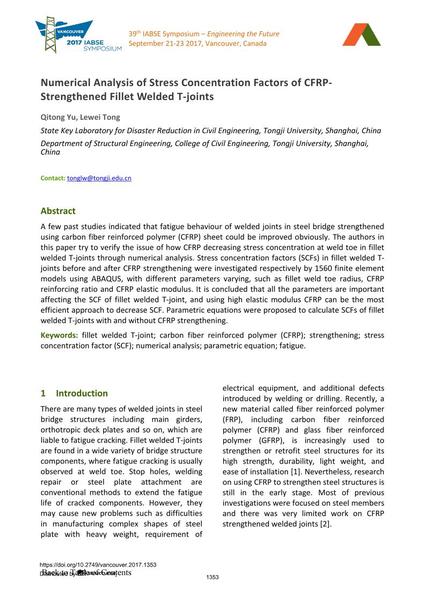Numerical Analysis of Stress Concentration Factors of CFRP- Strengthened Fillet Welded T-joints

|
|
|||||||||||
Bibliografische Angaben
| Autor(en): |
Yu Qitong
(State Key Laboratory for Disaster Reduction in Civil Engineering, Tongji University, Shanghai, China
)
Tong Lewei (Department of Structural Engineering, College of Civil Engineering, Tongji University, Shanghai, China) |
||||
|---|---|---|---|---|---|
| Medium: | Tagungsbeitrag | ||||
| Sprache(n): | Englisch | ||||
| Tagung: | IABSE Symposium: Engineering the Future, Vancouver, Canada, 21-23 September 2017 | ||||
| Veröffentlicht in: | IABSE Symposium Vancouver 2017 | ||||
|
|||||
| Seite(n): | 1353-1360 | ||||
| Anzahl der Seiten (im PDF): | 8 | ||||
| Jahr: | 2017 | ||||
| DOI: | 10.2749/vancouver.2017.1353 | ||||
| Abstrakt: |
A few past studies indicated that fatigue behaviour of welded joints in steel bridge strengthened using carbon fiber reinforced polymer (CFRP) sheet could be improved obviously. The authors in this paper try to verify the issue of how CFRP decreasing stress concentration at weld toe in fillet welded T-joints through numerical analysis. Stress concentration factors (SCFs) in fillet welded T- joints before and after CFRP strengthening were investigated respectively by 1560 finite element models using ABAQUS, with different parameters varying, such as fillet weld toe radius, CFRP reinforcing ratio and CFRP elastic modulus. It is concluded that all the parameters are important affecting the SCF of fillet welded T-joint, and using high elastic modulus CFRP can be the most efficient approach to decrease SCF. Parametric equations were proposed to calculate SCFs of fillet welded T-joints with and without CFRP strengthening. |
||||
| Stichwörter: |
Ermüdung Verstärkung numerische Analyse
|
||||
